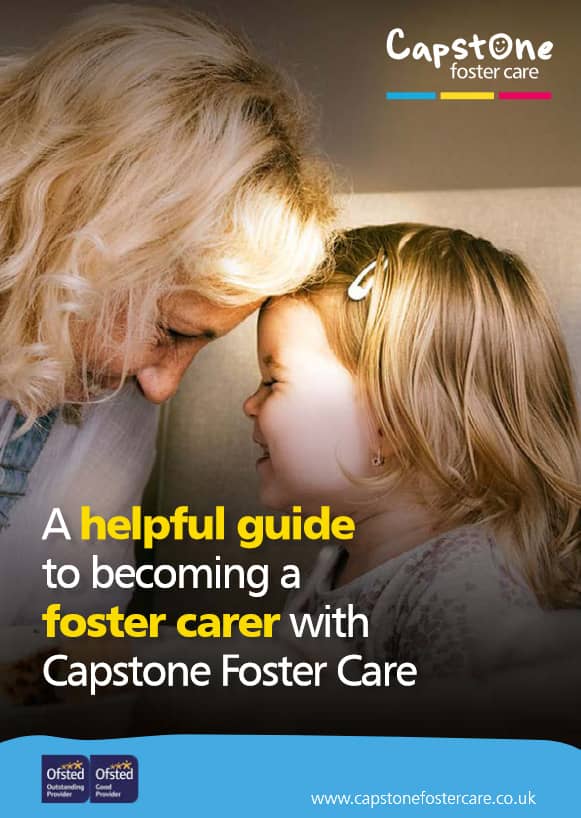


Fostering a disabled child
The role of an independent fostering agency
How to choose a foster care agency
Can I choose who I foster?
What are the benefits of fostering with an independent fostering agency?
What happens when a child is taken into care?
Fostering process: what happens on an initial home visit?
Fostering with local authority vs independent agency
A complete guide to becoming a foster carer
How Are Children in Foster Care Matched with Carers?
Foster Care Budgeting Tips
Becoming A Foster Carer
What is a Care Leaver?
What is a Foster Carer?
Fostering Regulations
How long does it take to become a Foster Carer?
What are the Foster Care requirements?
Changing IFA - Transferring to Capstone
8 reasons why a child may be taken into care
Fostering as a Career
Can you foster if you smoke or vape?
A guide to fostering assessments
LGBTQ+ Fostering
Equality, Inclusion & Anti-discriminatory Practice in Foster Care
What can disqualify you from foster care?
Can you foster if you’re on benefits?
Top transferable job skills to become a foster carer
Fostering as a same sex couple
Fostering while renting
Can you foster if you have mental health issues?
Is there an age limit for fostering in the UK?
Do foster carers get a pension?
How to foster a child: A step by step guide
How do DBS Checks Work?
Can I foster if...?
Mythbusting the top 10 Foster Care Myths
Can I foster if I am disabled?
LGBT Fostering Mythbusting
Can I foster if I have pets?
Can I Foster A Child?
Can I Foster and Work?
Can you Foster with a Criminal Record
Can Single People Foster?
LGBT Family and Foster Care
Fostering across Cultures
Muslim Fostering
Christian Foster Care
Sikh Fostering
Empty Nest Syndrome and Foster Care
Can I Foster?
What is the difference between residential care and foster care?
Fostering Babies and Young Children
What is Kinship Care?
Fostering Babies - Myths
Focusing on Parent & Child Fostering
Fostering Siblings
Fostering Teenagers
Fostering Teenagers - Breaking down the Myths
Fostering Unaccompanied and Asylum Seeking Children
Mother and Baby Foster Placements
Private Fostering
How does therapeutic fostering work?
Young Children Fostering Placements
Difference between short and long-term fostering
Types of self-harm
A Guide to the Foster Care Handbook
Reunification and Birth Parents: A Guide for Foster Carers
What is an EHC Plan? A Guide for Foster Carers
How to prepare a child for becoming a care leaver
Children who foster: impact of fostering on birth children
Fostering LGBTQ+ Youth
How to prepare your home for a foster child
How to help a lonely child: A Guide for Foster Carers
What are the National Minimum Standards for Fostering Services?
10 tips for foster children's education
How to prepare your foster child for secondary school
Tips for coping when foster placements end
Tips for foster parents during Coronavirus
What happens if foster parents get divorced?
5 ways to manage Mother's Day with foster children
Tips for managing foster children's bedtime routines
How to handle foster child bullying
Fostering allowances and the gender pay gap
What discounts can foster carers get?
How to adopt from Foster Care
5 ways to manage Father's Day for children in foster care
8 most common fostering challenges
FosterTalk Membership with Capstone Foster Care
Supporting foster children's contact with birth families
A guide to independent fostering
Keeping Children Safe Online: A Guide For Foster Carers
Movies About Foster Care
Play-based learning strategies for foster carers
A Guide to the Staying Put Program
Why Foster Parent Wellbeing Matters
How to deal with empty nest syndrome
How to recognise signs of depression in foster children
Can you take a foster child on holiday?
Tips and advice on fostering with a disability
10 tips on connecting with your Foster Child
Fostering vs Adoption - What's the difference?
How Fostering can change a future
How to adopt from Foster Care
How to encourage children to read in Foster Care
How to prepare a Foster Child's bedroom
Reading and Storytelling with Babies and Young Children
Supporting Children's Learning
The 20 most recommended books Foster Carers and young people should read
Things you can do when your children leave home
The impact of early childhood traumas on adolescence and adulthood
Anxious Disorders in Foster Children
What is sexual abuse and sexual violence
Foster Child behaviour management strategies
Foster Parent Advice: What to expect in your first year of fostering
Capstone's twelve tips at Christmas
10 celebrities who grew up in Foster Care
Could Millenials be the solution to the Foster Care crisis?
Do you work in Emergency Services?
Form F Assessor and Assessment Training
Foster Care Fortnight
Improving Children's Welfare - Celebrating Universal Children's Day
New Year - New Career - Become a Foster Carer
Young People Charities
Starting secondary school is a daunting prospect for even the most settled children. This feeling is magnified for foster children, who are also adjusting to living in a new home and getting used to their new family.
Whether you’re fostering a new arrival who is about to start secondary school, or a child already settled into the family, it’s vital you offer support and guidance to help them through this period of change. That’s why we’ve put together some helpful tips about how you can make your child’s transition from primary to secondary school as smooth and stress-free as possible.
One of the best ways to prepare your foster child for secondary school is to help them organise their morning routine before the beginning of term. This can cover everything from the time they need to wake up and have breakfast, through to sorting a family schedule for the bathroom, and making sure their bag is fully packed each day.
How will your child be getting to school? If they’re walking, practise the route to and from school together. Or if they will be travelling by bus, make sure they know which bus they need to catch and at what time. Ultimately, a morning routine sets the mood of the day ahead and will help to give your child a sense of security and stability.
As a foster carer, it's important that you're not only aware of the key members of staff that are supporting your child, but you make yourself known to them, too. There may be a designated Looked After Child (LAC) lead teacher – who is a regular member of staff with additional responsibility, knowledge and authority over anything your child may need or be faced with during the school year. Then there's also the Head of Year, who will be the first port of call should any issues arise regarding your child. Find out more about how these teachers can help support your child in our back to school guide.
We're all familiar with the stress when we realise we've forgotten something – and this would be enhanced for a foster child starting secondary school. By investing in the right uniform and school equipment such as stationery and books, you're giving your child a better chance of fitting in with their classmates. Your foster child might not feel confident enough to ask you for certain supplies, so take a proactive approach. If you're in any doubt of what's needed, check the school’s policy on their website.
Your foster child may have experienced disrupted education and by completing their homework, they can help teachers to get them back on track by identifying their strengths and weaknesses. If your child is struggling to get started with their homework, why not sit down and help them? This will make the tasks feel a lot less daunting and give you both an opportunity to bond. Most secondary schools give children a homework diary, so you should check that regularly to help your child stay organised.
Whether it's anxiety with settling in, bullying or stress around schoolwork, there are a number of reasons why your foster child may not want to attend secondary school. However, it’s a legal requirement and time out of the classroom can have a strong impact on a child’s achievement through school and disrupt their routine. If your child is showing signs of not wanting to attend school, or avoids talking about it altogether, try to get to the root cause of the issue.
It’s common for foster children to have challenges making friends and connecting with people. This can often be put down to distressing life experiences and underdeveloped social skills. One way you can help your child break out of their shell is by encouraging them to make friends with people who have similar interests. Extracurricular clubs around sports, music or games provide plenty of opportunities to have fun while meeting new people.
If you have any more questions about the best ways you can support your child as they start secondary school, or about fostering in general, get in touch with our friendly team today. You can also watch out handy video on the transition from primary school to secondary school!
If you’ve got any questions or would like to find out more about fostering with Capstone, fill out the form below.
An experienced fostering advisor from your local area will then be in touch.

Start the conversation today. Our team of friendly advisors are on hand to answer any foster care questions you may have. We can offer you honest and practical advice that can help you decide if becoming a foster carer is the right path for you.


